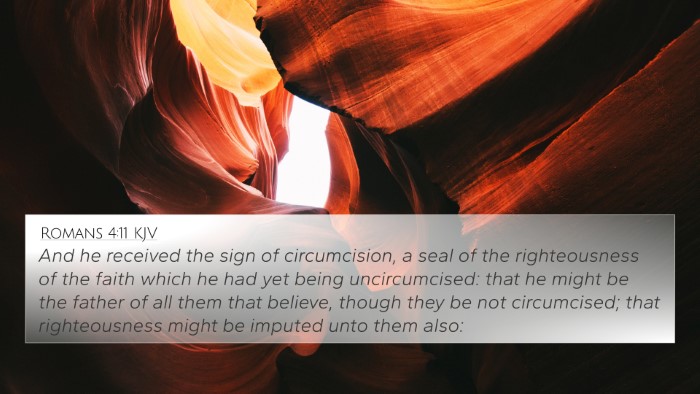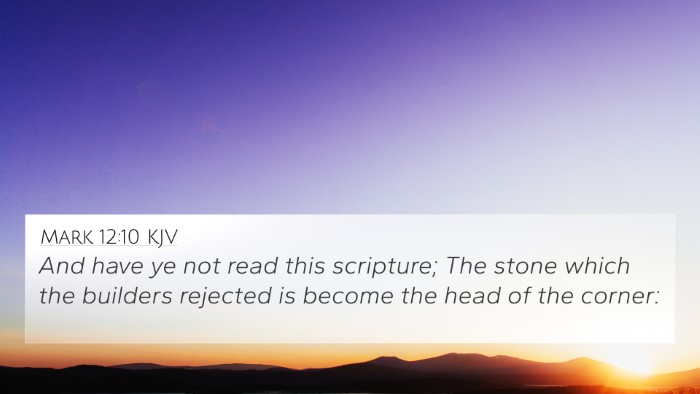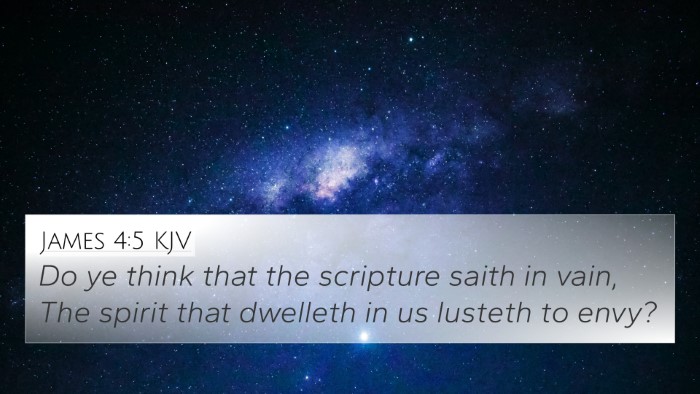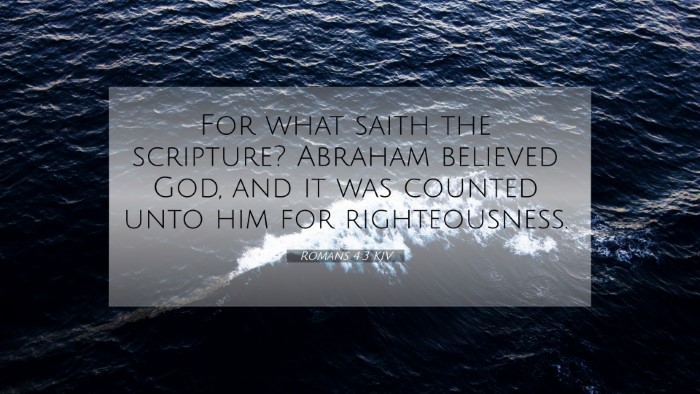Old Testament
Genesis Exodus Leviticus Numbers Deuteronomy Joshua Judges Ruth 1 Samuel 2 Samuel 1 Kings 2 Kings 1 Chronicles 2 Chronicles Ezra Nehemiah Esther Job Psalms Proverbs Ecclesiastes Song of Solomon Isaiah Jeremiah Lamentations Ezekiel Daniel Hosea Joel Amos Obadiah Jonah Micah Nahum Habakkuk Zephaniah Haggai Zechariah MalachiRomans 4:3 Similar Verses
Romans 4:3 Cross References
For what saith the scripture? Abraham believed God, and it was counted unto him for righteousness.
Uncover the Rich Themes and Topics of This Bible Verse
Listed below are the Bible themes associated with Romans 4:3. We invite you to explore each theme to gain deeper insights into the Scriptures.
Romans 4:3 Cross Reference Verses
This section features a detailed cross-reference designed to enrich your understanding of the Scriptures. Below, you will find carefully selected verses that echo the themes and teachings related to Romans 4:3 KJV. Click on any image to explore detailed analyses of related Bible verses and uncover deeper theological insights.

James 2:23 (KJV) »
And the scripture was fulfilled which saith, Abraham believed God, and it was imputed unto him for righteousness: and he was called the Friend of God.

Romans 4:9 (KJV) »
Cometh this blessedness then upon the circumcision only, or upon the uncircumcision also? for we say that faith was reckoned to Abraham for righteousness.

Romans 4:5 (KJV) »
But to him that worketh not, but believeth on him that justifieth the ungodly, his faith is counted for righteousness.

Romans 4:11 (KJV) »
And he received the sign of circumcision, a seal of the righteousness of the faith which he had yet being uncircumcised: that he might be the father of all them that believe, though they be not circumcised; that righteousness might be imputed unto them also:

Psalms 106:31 (KJV) »
And that was counted unto him for righteousness unto all generations for evermore.

Romans 11:2 (KJV) »
God hath not cast away his people which he foreknew. Wot ye not what the scripture saith of Elias? how he maketh intercession to God against Israel saying,

Romans 9:17 (KJV) »
For the scripture saith unto Pharaoh, Even for this same purpose have I raised thee up, that I might shew my power in thee, and that my name might be declared throughout all the earth.

Mark 12:10 (KJV) »
And have ye not read this scripture; The stone which the builders rejected is become the head of the corner:

Isaiah 8:20 (KJV) »
To the law and to the testimony: if they speak not according to this word, it is because there is no light in them.

James 4:5 (KJV) »
Do ye think that the scripture saith in vain, The spirit that dwelleth in us lusteth to envy?

2 Peter 1:20 (KJV) »
Knowing this first, that no prophecy of the scripture is of any private interpretation.
Romans 4:3 Verse Analysis and Similar Verses
Understanding Romans 4:3
Bible Verse: Romans 4:3 - "For what saith the scripture? Abraham believed God, and it was counted unto him for righteousness."
Overview of the Verse
This verse is pivotal in understanding the doctrine of justification by faith. It cites Genesis 15:6 where Abraham's faith in God's promise is acknowledged as the basis for his righteousness. This highlights a fundamental theme in Biblical teaching: that faith, rather than works, is the means by which individuals are deemed righteous before God.
Commentary Insights
Insights from Matthew Henry
Matthew Henry emphasizes that the faith of Abraham was not simply belief in existence but a profound trust in God’s promises. He interprets this verse as a declaration of the way God counts faith as righteousness, which underscores the grace inherent in the Gospel. Henry encourages readers to recognize that this doctrine of justification is universally applicable to all believers, not just those under the law.
Insights from Albert Barnes
Albert Barnes draws attention to the contrast between the righteousness obtained by faith and that sought through works. He illustrates how Abraham’s example was used by Paul to demonstrate that faith was the true path to salvation, setting a precedent for all believers. Investments in the theme of grace, he argues, are essential for understanding the nature of faith and righteousness in a believer's life.
Insights from Adam Clarke
Adam Clarke discusses the implications of 'counted for righteousness', explaining that this was a legal term indicating that Abraham was declared righteous, not based on his deeds but on his faith in God's promise. Clarke elucidates the importance of this concept in the context of both Jewish and Gentile believers, illustrating how unity in faith transcends cultural and historical divides. He suggests that this verse encapsulates the essence of salvation as a gift from God received through faith.
Related Bible Cross-References
- Genesis 15:6: "And he believed in the LORD; and he counted it to him for righteousness."
- Galatians 3:6: "Even as Abraham believed God, and it was accounted to him for righteousness."
- James 2:23: "And the scripture was fulfilled which saith, Abraham believed God, and it was imputed unto him for righteousness: and he was called the Friend of God."
- Romans 3:28: "Therefore we conclude that a man is justified by faith without the deeds of the law."
- Ephesians 2:8-9: "For by grace are ye saved through faith; and that not of yourselves: it is the gift of God: Not of works, lest any man should boast."
- Titus 3:5: "Not by works of righteousness which we have done, but according to his mercy he saved us, by the washing of regeneration, and renewing of the Holy Ghost."
- Philippians 3:9: "And be found in him, not having mine own righteousness, which is of the law, but that which is through the faith of Christ, the righteousness which is of God by faith."
Thematic Connections
This verse articulates a core theme within the Scriptures regarding faith and righteousness, connecting both the Old and New Testaments. The recognition of Abraham’s faith as righteousness forms an inter-Biblical dialogue, showcasing the continuity of God’s plan for salvation throughout the ages. Readers can explore these connections further through comparative Bible verse analysis and thematic Bible verse connections.
Conclusion
In Romans 4:3, we find not just a statement of fact regarding Abraham’s faith, but a profound theological principle that impacts all believers. Justification by faith becomes a rallying cry for Christians, emphasizing the power of trust in God over reliance on personal merit. This verse opens the door to understanding the broader implications of faith throughout the Scriptures, providing tools for Bible cross-referencing and deeper exploration into the relationships between various Biblical texts.






